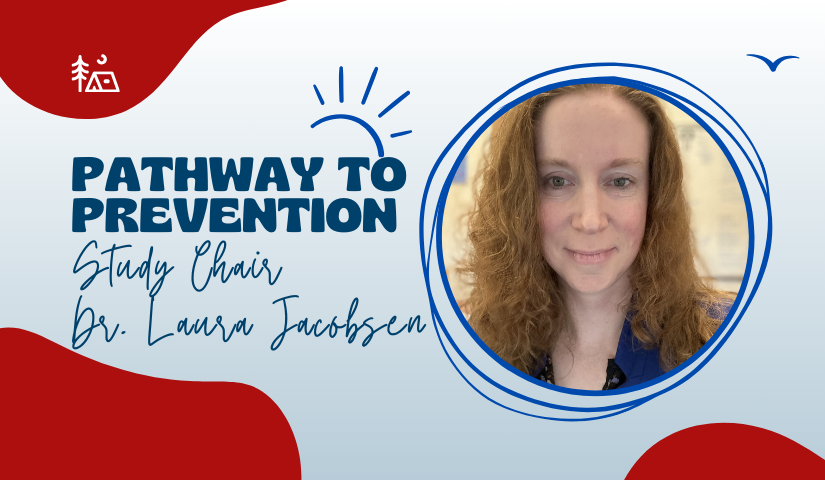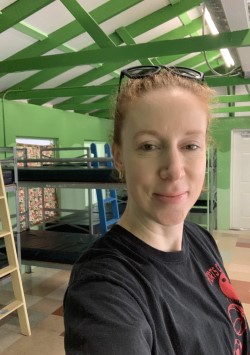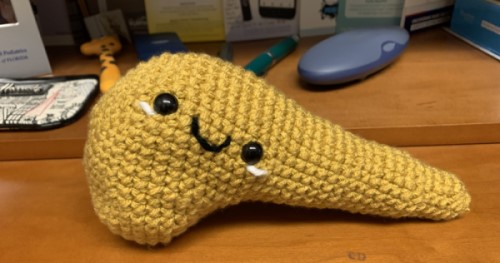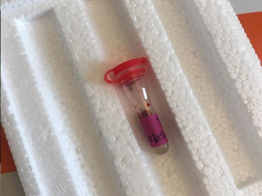
Introducing TrialNet Pathway to Prevention Study Chair Laura Jacobsen, MD
Pathway to Prevention Study Chair Laura Jacobsen, MD, is an assistant professor and pediatric endocrinologist at the University of Florida, Gainesville.
Meet TrialNet’s new Pathway to Prevention Study Chair, Laura Jacobsen, MD, assistant professor and pediatric endocrinologist at the University of Florida, Gainesville. Her first order of business: implementing changes to expand type 1 diabetes (T1D) screening and monitoring.
Children as young as two years old who have a relative with T1D are now eligible to participate in the Pathway to Prevention Study. Previously, the minimum age was two and a half. Another recent change to the Pathway to Prevention Study protocol will increase the frequency of monitoring visits from once a year to every six months for people who test positive for two or more diabetes-related autoantibodies.
“Increased monitoring will allow us to keep a closer eye on changes nearer to disease onset and identify people most at risk,” Dr. Jacobsen said. “People in this group are at the same stage as participants in the TrialNet Teplizumab Prevention Study, which led to the first FDA-approved immune therapy to delay T1D in people at risk.”
Monitoring programs such as TrialNet’s markedly reduce the risk of diabetic ketoacidosis (DKA), a serious and potentially life-threating condition. For those taking part in research, the risk of being diagnosed in DKA decreases from more than 30% (and about 40% under age 5) to less than 3%.
Dr. Jacobsen credits previous Pathway to Prevention Study Chair Diane Wherrett, MD, and the TrialNet clinical research team with the study’s recent changes. “The Study would not be where it is today without the previous Chairs, and most recently Dr. Wherrett. She’s been an incredible leader.”
Dr. Wherrett, TrialNet Principal Investigator at The Hospital for Sick Children (SickKids), Toronto, Canada, served as Pathway to Prevention Study Chair from August 2016 to April 2024.
As Study Chair, Dr. Jacobsen sees her primary role as keeping the Pathway to Prevention Study protocol and data as rigorous and reliable as possible. “Our job is to make sure the protocol is clear and to support our research teams,” she said. “We are also responsible for making changes and updating the study protocol as needed.”
Dr. Jacobsen was inspired to become a doctor and pediatric endocrinologist while volunteering at the Florida Diabetes Camp as a college student.
In addition to recent changes in screening and monitoring, later this year TrialNet will offer limited rescreening for children and teens who previously tested negative for diabetes-related autoantibodies.
“It’s an exciting time to be leading the Pathway to Prevention Study,” said Dr. Jacobsen. “There are many research initiatives taking place across the world to increase T1D screening in relatives and in the general population or as part of routine clinical care.”
Over the past 20 years, more than 240,000 relatives of people with T1D have participated in the Pathway to Prevention Study, leading to a better understanding of the disease and how it progresses.
“TrialNet is a world leader with regard to screening, monitoring, and prevention clinical trials,” said Dr. Jacobsen. “We've learned a lot about risk markers for T1D and increased our understanding regarding which people are likely to progress quickly or slowly once they are in an autoantibody-positive state,” explains Dr. Jacobsen. “This research has resulted in numerous papers published by researchers within and outside TrialNet. So, there’s a lot we can do to help the T1D community to increase both clinical screening and research screening.”
If someone learns they have diabetes-related autoantibodies through clinical screening outside TrialNet, they can receive a free confirmatory screening through TrialNet. Those with a single autoantibody will be offered annual rescreening. Those with two or more autoantibodies will be invited to visit a TrialNet location to learn what stage of diabetes they are in and if they are eligible for a clinical trial aimed at stopping disease progression.
Dr. Jacobsen says one of her top priorities is exploring precision approaches to screening and monitoring in TrialNet. For example, “Can we use the vast data that TrialNet has collected in the Pathway to Prevention Study to make screening more high yield and monitoring more efficient?”
Dr. Jacobsen was first introduced to TrialNet in 2016 while completing her fellowship in pediatric endocrinology at UF. Since then, she has served on several committees and participated in TrialNet’s Emerging Leader Program.
In her spare time, Dr. Jacobsen enjoys crocheting. She has even crocheted little organs like the pancreas. In addition to being fun, she says, “it’s a great way to destress at the end of a busy day.”








